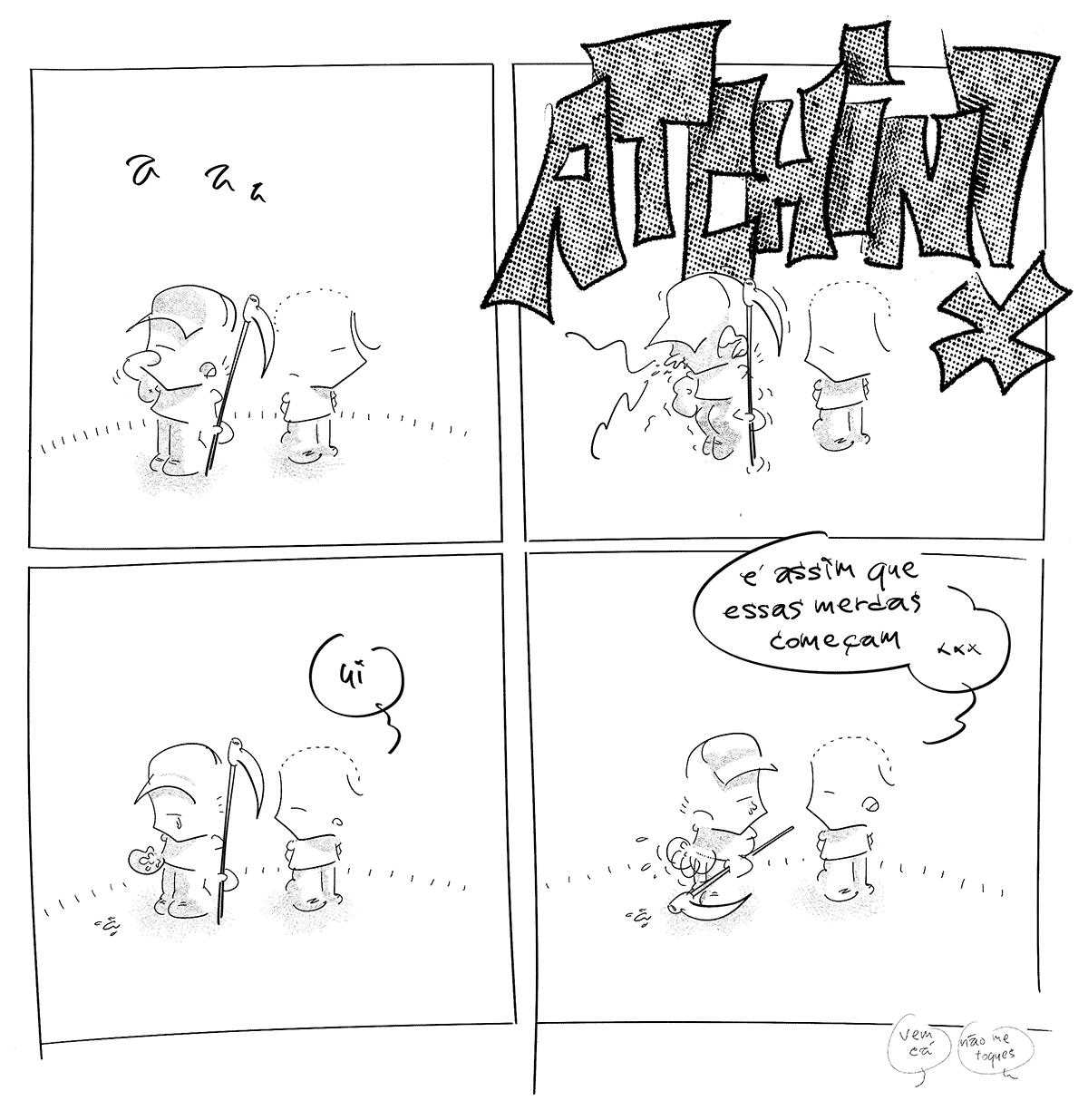a mais breve história da teoria cultural marxista que precisas de saber

Do Jeremy Gilbert, o seu capítulo (versão expandida) do "A Brief History of Marxist Cultural Theory" incluida nas 1 804 páginas do "The SAGE Handbook of Marxism" 2021, um "rigorous and challenging collection of scholarship" com um "stunning range of contributions from contemporary academics, writers and theorists from around the world and across disciplines".
Começando dos 3 soviéticos, Luckacs, Voloshinov, Bakhtin — protegidos do desencanto da revolução falhada porque..., soviéticos, por lá foi um sucesso — entra-se na cultura como ideologia,
The Marxist approach to the study of culture was informed by a number of core suppositions. The first is that in a capitalist society, most 'culture', or at least most widely-disseminated culture, will be capitalist in nature. As such, it will serve a number of key functions. It will present the world-view of the capitalist class as natural, normal and unchallengeable.
in "A Brief History of Marxist Cultural Theory" 2021
...que rapidamente nos traz ao inevitável, incontornável, italiano Antonio Gramsci, "all of Gramsci's thought is animated by the need to understand what the conditions might be for successful revolutionary struggle" e "still remains the paradigmatic starting point for any Marxian consideration of the politics of culture, or the culture of politics":
The predictable resurgence of authoritarian populism on the political right, and the resurgence of mass democratic politics on the left, has since then entirely killed the idea that we are not still living, broadly speaking in the political and cultural, universe described by Gramsci.
in "A Brief History of Marxist Cultural Theory" 2021
O capítulo segue com o "Mid-Century Pessimism" e a vitória do fascismo, a escola de Frankfurt, Theodor Adorno e Max Horkheimer, pontes à sociedade do espetáculo de Guy Debord, "a near-apocalyptic diagnosis of a society in which everyday life has been totally subsumed and totally reified by capitalist social relations". Paralelo, as "Utopian Alternatives", Walter Benjamin, a obra de arte desacralizada e "understanding that the first object of historical materialist analysis must always be the to understand the genealogy of the present". Ernst Bloch (*) A quem nunca dedicamos uma linha nOS POSITIVOS: acabámos de confirmar, zero resultados, Freud explicará essa eventualmente... e a história / natureza das utopias, ex-salsicha Herbert Marcuse, popular entre "bohemians and cultural revolutionaries", que "argued that the specific forms of personal liberation offered by modern consumer culture actually had a repressive and oppressive function". Jean-Paul Sartre, Andre Breton, outros surrealistas, Henri Lefebvre, crítica da vida quotidana e o direito à cidade seguido do "The Structuralist Moment" com Jacques Lacan sobre teorias de Ferdinand de Saussure, todos a viver na mesma urbe de Roland Barthes & Louis Althusser: "both deserve to be read far more widely than they currently are, but neither plays a very significant role in recent debates in the field" apesar da "crucial contribution made by both Barthes and Althusser to the theorization of culture as ideology" por expor "the ways in which cultural codes (visual and linguistic) were deployed in order to normalize, naturalise and de-historicize the capitalistic common-sense of his day." Novas modas, "Beyond Freudo-Marxism" e o pós-estruturalismo, a década de sessenta, a rejeição de Marx em diversos quadrantes, e o "the unlikely philosophical duo" de Gilles Deleuze e Félix Guattari (*) Caros: estamos a saltar esta gente em acelerado pq já vos trouxemos toda essa literatura antes. com o "most ambitious synthesis of Marxism and psychoanalysis to date", um "unique set of intellectual tools for the analysis of power relationships at every conceivable scale".
Destes é um salto ao "The Reversal of Perspective", Mario Tronti, Maurizio Lazzarato, "autonomous (often squatted) community spaces for cultural production", Michael Hardt & Toni Negri, "arguably the most significant innovators in Marxist theory of the past two decades". Década de setenta ao horizonte e os "Estudos Culturais" de E.P. Thompson et al, "the single most important conduit for Marxist ideas into public life and political discourse over that period", Raymond Williams, Stuart Hall e o CCCS. Oitenta e noventa, Michel Foucault, feminismo e anti-racismo são novidade maior que o determinismo socio-económico do materialismo histórico e relações de classes, o pós-marxismo e políticas identitárias enfraquecem o marxismo clássico "while self-identified Marxists sneered at the conceptual promiscuity and suspect political commitment of 'cult studs'." Nós nesse debate: meh. Vamos esperar que assentem, pelo menos fechem definições. Concluam conclusões, subscreveremos por baixo o que for consensual e retomamos daí. Do estado da arte às gerações que se seguem pois não vai ser nesta que o resolvem,
There are straight white male leftists who evince no interest in issues of gender, sexuality or race. There are middle-class and elite women of colour whose main political interest is in securing access to social privileges denied to them by racism and sexism, but not by their economic circumstances. [...] These debates are particularly prominent in para-academic debate over the Marxist understanding of culture: in the world of academically-academically-informed blogs, social media and polemical conference papers, rather than of peer-reviewed conference papers and carefully researched monographs. They are often framed in terms of a conflict between 'Marxists' who believe in pursing 'class politics', and those who believe in 'identity politics' or 'intersectionality': the latter terms more-or-less designating an emphasis on issues specifically affecting non-white, female, queer or trans people.
in "A Brief History of Marxist Cultural Theory" 2021
Anyhoos,
The most revolutionary feature of the women's liberation movement was its demand for the transformation of social relations far older and apparently fixed than those that define capitalism.
in "A Brief History of Marxist Cultural Theory" 2021
...e seguimos de Simone de Beauvoir com Judith Butler aterrados no "Classical Marxism in The Twenty-First Century" de Slavoj Zizek cujo "maitre a penser is not Marx, but Lacan". Finalmente, nenhum "roll-call of Marxist cultural theorists" fecha (*) Note to self: algures saltámos o Jean Baudrillard: já o tratamos nos P+ algumas vezes, procurem. sem Frederic Jameson, pósmoderno "famous for his great analytical injunction - 'always historicize'", "emphasising the ways in which the shift to a culture of apparently extreme relativism and pluralism was being driven by advances in capitalism and an intensification of the general logic of commodification".
Conclusões então. Nossas,
A primeira, subentendam da deles,
In the early twenty-first century, blog culture, podcasting and a new wave of radical publishing has expanded the market for radical cultural criticism way beyond the old audience for erudite print-media critics or purely academic literature In all of these domains, it is a form of Marxist critique informed by the tradition described here that supplies the critical lingua franca for a new generation of popular intellectual production: such as [Mark] Fisher's Capitalist Realism.
in "A Brief History of Marxist Cultural Theory" 2021
...do qual fizemos breakdown em 9 partes a começar aqui.
A segunda obriga-nos ao início do artigo: apesar da sua importância / impacto / rios de tinta e académicos de poleiro em estudos culturais que ombreiam a escola política que lhe devemos ("the development of Marxist cultural theory is inseparable from the development of Marxist political theory"), este é um caminho que se começou de nenhures.
The word 'culture' (or any German equivalent) does not appear frequently, if at all, in Marx's major works.
in "A Brief History of Marxist Cultural Theory" 2021
Senhores... ain't that a bitch?

